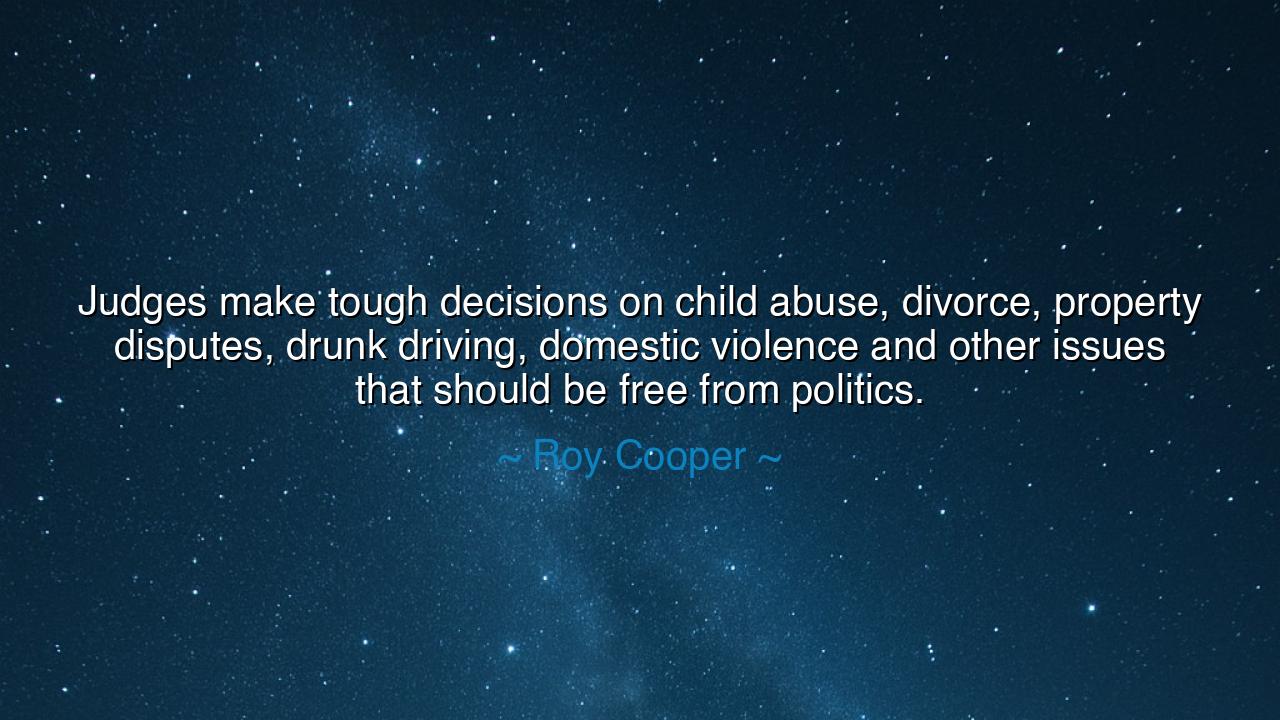
Judges make tough decisions on child abuse, divorce, property
Judges make tough decisions on child abuse, divorce, property disputes, drunk driving, domestic violence and other issues that should be free from politics.






O Seekers of Justice and Truth, hear the words of Roy Cooper, who speaks to the solemn duty of the judge: "Judges make tough decisions on child abuse, divorce, property disputes, drunk driving, domestic violence, and other issues that should be free from politics." In these words lies a powerful call to preserve the sanctity of the judicial process. Judges are entrusted with the responsibility to deliver justice, not swayed by the tides of political winds, but guided by law, ethics, and a deep understanding of the human condition. In matters of such weight, the scales of justice must remain balanced, free from the corrupting influence of external agendas.
Consider, O Children, the great responsibility of the judge, who sits at the helm of difficult, often heart-wrenching decisions. It is their sacred duty to separate emotion from reason, to look at each case with a clear mind and a steadfast heart. The decisions they make are not merely about the letter of the law but about the human lives affected. When a judge rules on matters of abuse or violence, they must be guided by the truth, not by political influence or the pressure of public opinion. To let politics shape such decisions is to betray the trust placed in them by society and to corrupt the very essence of justice.
Look to the example of Socrates, whose trial and subsequent death sentence exemplify the dangers of a corrupt political system manipulating justice. Socrates was condemned not because of his actions but because his ideas threatened the power structures of Athens. His trial, driven by political motivations, was a tragedy that blurred the line between justice and personal vendettas. Socrates' death teaches us that when politics enters the realm of justice, the very foundation of truth is shaken. The wise judge knows that justice must stand independent, untainted by the whims of political forces.
And so, O Seekers, let us understand that the role of the judge is one of the highest forms of service to society. It requires unwavering commitment to integrity, fairness, and objectivity. To let political considerations influence a judgment is to undermine the sacred trust that society places in the courts. The wise know that in times of great challenge, the judge must remain unflinching, holding fast to the principles of law and equity—not swayed by the shifting tides of political power.
Let us, therefore, strive to protect the sanctity of justice in all our dealings. In a world where politics often threatens to cloud our vision, let us remember that true justice requires that we act with honor and dignity, free from the shackles of external influence. In matters of the deepest human suffering, such as child abuse or domestic violence, we must hold firm to the truth, undistracted by the noise of political agendas. The judge, like the wise and just ruler, must always seek to serve the greater good, ensuring that justice is not a tool for power, but a guiding light for the soul of the community.






GFGhy Fffyyyg
Comparatively, systems balance independence and accountability in different ways: fixed terms versus life tenure, disciplinary commissions versus impeachment, single-judge trials versus mixed panels. Which configurations reduce political leverage while preserving corrective mechanisms when misconduct occurs? I’d like a matrix: selection method, tenure length, removal process, and typical vulnerabilities (capture by parties, pressure from executives, or populist backlash). Where have reforms—like nonpartisan nominating commissions or mandatory cooling-off periods after political roles—meaningfully improved trust without isolating courts from the communities they serve?
BCPham Tran Bao Chau
As a voter, I struggle to evaluate judicial candidates without relying on partisan cues. What signals actually predict fair, empathetic, law-bound judging? Maybe a portfolio of authored opinions, trial-court performance metrics, peer evaluations, and recusal history presented in neutral summaries. Are there red flags—overturned rates out of line with peers, intemperate courtroom conduct, or fundraising from frequent litigants? Please outline a practical, nonpartisan rubric an ordinary person can use before marking a ballot in judicial elections or retention votes.
DDQuoc Dai Dang
I’m curious about measurement. If neutrality is the goal, how do we know courts are meeting it? Could we publish anonymized dashboards on sentencing variance, pretrial detention rates, time to disposition, and appeal reversals—broken down by case type—so the public sees patterns without politicizing individual judges? And if risk-assessment tools are used, what audits prevent them from cementing old biases? I’d like criteria for responsible transparency: enough data to spot disparities, strong privacy protections, and independent review of algorithms and human decisions alike.
NKNguyen khang
Cases like child abuse or domestic violence already carry enormous trauma. When media narratives, hashtags, or legislative agendas hover over the courtroom, pressure intensifies. What practical steps can reduce that heat? For example, tighter gag orders, juror sequestration in high-profile matters, or independent victim-advocacy liaisons. How do we ensure sensitivity to survivors while preserving due process? I’m looking for a checklist that helps courts balance privacy, transparency, and safety—so neither sensationalism nor ideology dictates outcomes in these deeply personal decisions.
TDTop Top Duong
As a citizen, I want courts insulated from partisan winds, but the mechanics confuse me. Should jurisdictions elect judges (democratic legitimacy) or appoint them (buffered from fundraising pressures)? How do we handle campaign donations from lawyers or interest groups who later appear in court—strict recusal, public financing, or both? I’d appreciate a plain-language explainer comparing models: selection method, accountability levers, recusal standards, and historical error rates. What guardrails most reliably protect victims and defendants without turning judges into political actors by proxy?